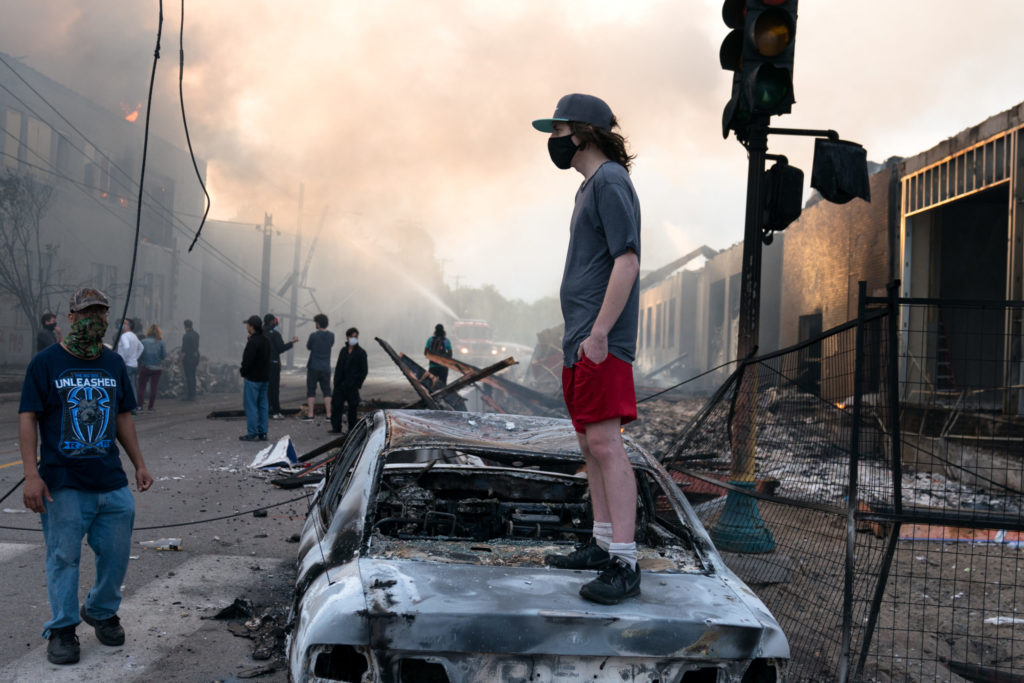My local newspaper has reported that nearly 600 businesses in the Twin Cities have been damaged in riots after the death of George Floyd on May 25, 2020. While it’s still too early to know exactly what the total cost will be from that example of unrest, insurance companies expect to see record losses from that event.
While I was on the street reporting on these events, I heard people defend the acts of property damage as a form of protest with various arguments of “insurance companies will cover it, so it’s not like we’re hurting people.”
Which got me wondering: How will the businesses hit by riots recover? What about people’s cars parked outside their home? Will insurance ‘cover it’ or will their lives be ruined? So we dug into the research and called lawyers around the country.
Bottom line:
- Businesses are usually covered against civil unrest, looting, vandalism, and arson by business/commercial property policies.
- Vacant buildings are sometimes excluded from coverage.
- Homeowners are usually covered, although some policies will exclude “business” property you keep at home (eg. a dedicated work laptop).
- Renters are only covered if they have a renters insurance policy. The landlord likely has a policy covering the building and fixtures, but not the renters property.
- Cars are usually covered by the “comprehensive” portion of an auto policy (not the “collision” part).
- Many policies specifically exclude acts of “terrorism.”
- Because the definition of who/what counts as terrorism is fuzzy and increasingly political, insurance companies might try to use a political statement (eg. “Those looters were terrorists!”) as an excuse to avoid payout.
- Even when covered, don’t expect insurance to pay for everything. Rainy-day funds to the rescue!
- The devil is always in the details, which is why we use broad terms like “usually.” Read your paperwork or press your insurance agent for clear and documented answers.
- Insurance companies are not your friend. Document everything reasonable. If you think they are rejecting a valid claim, lawyer up!
Building owner vs. building occupant
Regardless of whether you’re thinking about a business or an individual, one of the main things to keep in mind is the difference between who owns the building and who owns the unattached stuff inside of it. Policies tend to split along those lines.
A building owner almost always has insurance that covers the building and core/attached fixtures, whether it’s a commercial property or homeowner’s policy.
A business or person that’s renting the space does not automatically get coverage from the building-level policy held by the landlord. So if you are in a building but not the owner of it, you are not covered unless you get insurance for yourself, such as a renters policy.
Vice versa: Sometimes a building-level policy, such as a homeowner’s policy, will explicitly exclude a few or all unattached items inside the building. One of our homeowner’s policies, for example, will only cover up to $5,000 in “business property” held inside of the home — that could be a problem for people working from home or even just storing extra supplies/inventory, in which case you’d need to add an extra policy.
Commercial properties are usually covered during riots
“Riot is a covered peril under even a basic form property insurance policy,” said Steven Mikuzis from Mag Mile Law in Chicago. “Vandalism is also covered by most property insurance policies unless the buildings themselves are vacant.”
Simple, right? Not quite. Some insurance companies will still put up a fight and resist coverage.
“The bottom line is that some insurance companies look for more ways not to pay than for reasons for coverage,” said K.C. Williams from Williams Law, P.A. in Tampa, FL. “While ‘riots’ and ‘civil commotion’ seem to be the cause for many recent damages which should result in coverage, most insurance company attorneys will often argue the fine print and definitions to prevent commercial policyholders from receiving coverage for these events.”
The goal here isn’t to turn small businesses against insurance companies. But the lawyers we talked to advised caution. They said it’s a risk to assume ‘coverage’ means small business owners won’t have to pay anything at all.
Sometimes, promises of coverage can lull the insured into a false sense of security. “Insurance companies very often say that they will cover damages when they know that there is no good argument against coverage under the policies,” said Tina Willis from Tina Willis Law in Orlando, FL. “The question then becomes how much will they pay?”
Willis said that when insurance companies offer coverage, people tend to put their guard down. They assume their insurers will be fair and pay for most of the damage. But in Willis’ experience, the companies tend to pay less than they should.
The Terrorism Risk Insurance Act (TRIA)
In 2002 after the 9/11 terrorist attacks in New York, the United States introduced the Terrorism Risk Insurance Act. When the Secretary of the Treasury certifies an act of terrorism, the federal government steps in to pay for those claims.
Now that the federal government is backing those losses, private companies specifically offer terrorism insurance for businesses. If the Treasury certifies something as terrorism and an insurance claim is approved, the government will reimburse the insurance company.
Great, right? But now there’s a problem: What counts as terrorism?
During the May-June 2020 Black Lives Matter protests, President Trump declared that “Antifa” was behind the property damage and that he would label them as terrorists and their actions as domestic terrorism.
Attorney General William Barr issued a similar statement saying, “The violence instigated and carried out by Antifa and other similar groups in connection with the rioting is domestic terrorism and will be treated accordingly.”
Ignoring politics and politicians, neutral law enforcement has said that Antifa is not an actual organization and there was no solid evidence to support the claim they were behind the property damage.
That political maneuvering and disinformation can be confusing when figuring out black-and-white legal issues around insurance.
“The fact that Antifa is now [according to Trump] considered a terrorist organization has raised the question of coverage in legal circles,” said Erik Jacobs from Cicero, France, and Alexander, P.C. in Rockford, IL. “Acts of Terrorism and War are generally not covered under most policies. While there may be some litigation on this subject … I would think that the insurance companies would have to present some pretty compelling evidence of direct involvement by Antifa as the cause of the damage in order for the insurance company to win a coverage action.”
The thing is, that evidence is probably not there.
“It would be hard to prove, at least for insurance claims, that a group of vandals were Antifa vs random looters who were on the street at the same time,” said Brent Thurman, President of Keystone Insurance Services in Provo, UT.
Technically, it doesn’t matter what a politician says — according to the TRIA, all that matters is whether the Secretary of the Treasury officially certifies the act as terror. As of this writing (1-2 weeks after Trump’s statements), there’s been no official certification.
However, even though most people don’t expect that certification to actually happen (the legal bar for certification is much higher than a President’s tweet), statements from someone like the President might be used by an insurance company as an excuse to deny a claim. Even if the insurance company knows the law is not on their side, they might assume that normal folks don’t know better and don’t have the resources to fight it in court.
Coverage for homeowners, renters, and vehicles
Most homeowner and renters’ policies cover what insurers call ‘perils.’ Insurance companies typically consider fires, thefts, and explosions in this category, so riot damage is covered. Some homeowners also add ‘catastrophe’ insurance to their policies to make sure they’re covered in the case of a terrorist attack or riot.
If you rent your home, the situation is just a little bit stickier. The landlord’s insurance policy should cover any structural damage. If your windows are smashed or bricks from the building are stolen, it’s up to your landlord to file that claim. But if personal possessions are stolen, a renter must have a renters insurance policy to be covered.
“I have a client now that is stuck in that position,” said Erik Jacobs, the lawyer from Rockford, IL. “The building burned down but he did not have a separate renters policy, so he cannot recover for the loss of his personal items due to the fire.” Lawyers might be able to help you if you get stuck like this, but the best practice is to make sure you have renters insurance.
Car insurance also typically covers riots, especially if you have a new car with ‘comprehensive’ coverage. Comprehensive coverage typically protects car owners if something other than a collision occurs. Fires, riots, vandalism, or falling trees — all of this would require ‘comprehensive’ coverage. Check your insurance policy to make sure you have more than ‘collision’ coverage.
Documentation matters!
It doesn’t matter what the insurance salesman told you — all that matters is what’s in the paperwork. Reading insurance documents is not our idea of a fun time either, but do it if you care about this topic.
Many people use their annual prep review as a reminder to take pictures/videos of their property and to document the receipts and serial numbers of major new purchases.
When you find yourself in a possible insurance claim situation, document everything you can. Pictures, videos, witnesses, police reports, etc. are all relatively easy things to do that might save you years of frustration and/or a lot of money.


You are reporting the comment """ by on